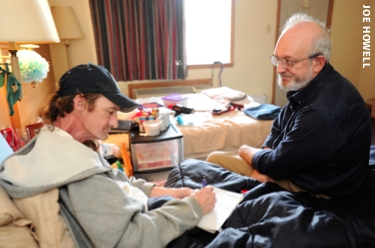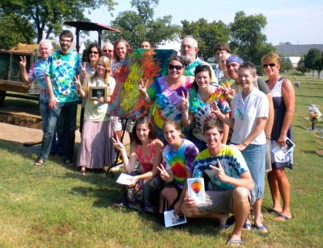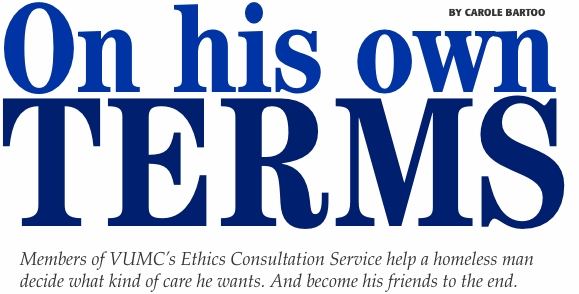In his own terms
Last winter, terminally ill with cancer, homeless and unable to speak, 47-year-old Ken Goslin was moving quickly toward an end of life that could have been painful and lonely.
But it didn’t turn out that way.
Efforts by a team at VUMC, at first acting in their official capacities and later as Goslin’s friends, changed his life. Vanderbilt’s Ethics Consultation Service was called on to provide good communication, but in the end, it helped Goslin find something far more valuable: a good end of life.
Living on the street with a brain tumor
People had disappointed Kenneth Goslin most of his life. He told friends his childhood was lost in a foster care system that didn’t work for him. A runaway since age 14, he lived a fiercely independent life on the streets. Goslin considered the transitory homeless community his family and had no intentions of ever changing his ways.
But then a cancerous brain tumor threatened the loss of not only his life, but something he may have valued even more: his independence.
Recurrent headaches and increasing disability brought Goslin to VUMC repeatedly throughout early 2010, but he wouldn’t stay long, returning to his preferred life among the city’s homeless. When weakness set in he acquired a wheelchair and kept frequenting his favorite downtown Nashville spots. When his vocal cords became paralyzed leaving him speechless he picked up a notepad and pencil so he could communicate by scribbled notes.
But in the summer of 2010 the tumor began to gain the upper hand. Kyle Weaver, M.D., assistant professor of Neurological Surgery and Otolaryngology, says he could see what was coming.
“Here’s a person who, if he didn’t have an operation, would die, sooner than later, and not in a pleasant fashion,” Weaver recalled.
Weaver told Goslin he believed an operation to reduce the tumor’s size could extend his life and improve its quality. Goslin’s reaction was frustrating to Weaver.
“He just wouldn’t show up, you didn’t know where to find him. He let us know his view was, ‘I will do what I want, show up if I want or don’t want.’ We were in a dilemma with him because ultimately you can’t take [brain surgery] a la carte. You have to buy into the program,” Weaver said.
As last winter set in Goslin returned to the hospital. He had lost the ability to swallow. It was time to make a decision. But even as Goslin lay in Vanderbilt’s neurology intensive care unit, Weaver felt his patient was stonewalling. He was explaining the risks and benefits of brain surgery to a patient who faced the wall, scribbled a short reply on a notebook, or even waved him away.
“My concern, honestly, was to avoid being judgmental,” says Weaver. “It didn’t pass the sleep-well-at-night test for me. I needed to communicate with him. That’s when I called for an ethics consult.”
“He knew who he was and what he wanted”
David Schenck, Ph.D., an ethicist with the Center for Biomedical Ethics and Society says sleeping well at night requires that people have a sense of knowing they have done all they could.

Schenck says the core of his actions in response to Weaver’s request was to ensure that everyone understood the big picture and details of medical choices. He also hoped to turn Goslin from a distant, non-communicative patient into an engaged one.
“When I first met him, he shook my hand and I thought, well the tumor hasn’t affected his grip. But I also felt fairly immediately this person knew who he was and what he wanted,” Schenck explained.
Standing over 6 feet tall, topped with sparse gray hair, Schenck is a patient listener and a natural protector. He was able to offer what a neurosurgeon could not—lots of time at Goslin’s convenience. Goslin’s note pads provided his voice and Schenck’s respectful approach laid the groundwork for trust to develop.
Elizabeth Heitman, Ph.D., who heads VUMC’s Clinical Ethics Consultation Service for the Center for Biomedical Ethics and Society, notes the service is commonly called to help make sense of complex communications—and there are lots of those in academic medical centers. The intersection between advanced medical treatment options offered by advanced medical experts, and the knowledge and expectations of regular people and their regular lives, can be an awkward one.
“Today it is common for ethicists to work to interpret policies for everyone involved so they can be put into action, and the patient can get the best possible care,” Heitman said.
Heitman said Schenck was ideal for Goslin’s case because he has logged years of experience as a volunteer in homeless shelters and hospices, in addition to his work in academic ethics, which allowed him to get to core questions such as: “What does comfort mean for a homeless man? What are the real choices here?”
“I have seen remarkable healing come through hospice care. Part of what I wanted him to know is he wouldn’t die alone. No one wants to die alone, and it is perhaps a heightened fear for those living on the street,” Schenck said.
“I feel like I want to cry”
Through the holidays, Schenck’s visits to the Neuro ICU could be described as social. He gradually developed a sense for when Goslin was most awake, and less in pain. He learned how and when Goslin would be ready to talk. A feeding tube had been placed, but the elephant in the room remained unaddressed until just before the New Year.
“I felt it was time to talk about decisions. I told him, I wanted 10 minutes of his time, that he wasn’t going to like the topic, but that if he was willing, I would need 10 minutes,” Schenck recalled. “He was in the bed rolled away from the door, so I went over to his side and kneeled. I wanted to be directly on eye level. I could see his face, he mine, and it was equal power. I needed to watch his face… especially if he couldn’t speak.”
With Heitman in the room to provide clarification on medical issues if needed, Schenck described the basics of what Weaver had told him about the option for surgical reduction of the brain tumor, followed by chemotherapy to improve his quality of life. Goslin wanted to know if weeks of recovery in the hospital would mean he couldn’t smoke. Schenck explained it did.
Goslin also heard a lot more about hospice. The conversation was difficult. Goslin listened, but didn’t reach for his note pad.
“When I finished, I asked him how he was feeling. He wrote “I feel like I want to cry.” I asked him if I could put my hand on his shoulder, so we sat there for a minute or two,” Schenck said.
No decisions were made that night, but Schenck said he achieved the goal of connecting with Goslin. He was able to communicate clearly what Weaver needed him to hear, and was also able to fill out the details about hospice. Finally Goslin indicated he understood.
Vanderbilt Divinity student, Lindsey Krinks, a homeless outreach worker and maybe Goslin’s main friend and support person in Nashville, witnessed Goslin working through that conversation over the next week. She says even after Goslin moved from Vanderbilt to a rehabilitation facility, he wrestled with it.
“That’s when hospice started becoming a concrete option. I didn’t project anything on him, but I asked him what he was thinking, what is the better life he envisioned for himself,” Krinks recalled. “The more he was educated, the better he was able to make this choice.”
Homeless man finds a home among friends
Goslin chose not to have the surgery.
He entered the care of a home hospice organization, which, with Lindsey’s help, arranged a place for him to live at the Drake Motel on Murfreesboro Road for six months. After Vanderbilt was no longer involved in Goslin’s medical care, Schenck’s role changed from ethics consultant to that of a volunteer, and friend.
And Goslin began to change from his angry, distant persona. His friends said he was peaceful. He had good pain relief and visitors every day, except Sunday; that was his day alone. He was able to smoke when he wanted to. He even took a hot air balloon ride, a gift from his supporters and hospice caregivers.
When he moved to a residential hospice, Schenck, Krinks, and his new community of friends and supporters took shifts at Goslin’s bedside. As it was clear that the end was growing near, the group held a celebration of Goslin’s life with him.

About a week after the celebration, on Aug. 17, Ken Goslin died the way he wanted to: comfortable and among friends, Schenck among them.
In reflection, Weaver says the Goslin’s choice of hospice over surgery is not the one he would have made for himself. He believes it shortened Goslin’s life. But he says the time and effort taken by the Ethics Consultation Service to reach someone thought to be unreachable was invaluable.
Schenck insists his role as a consultant in Goslin’s decision was no different than it would be for any other patient, without attempts to influence a decision one way or the other.
“I wanted to be certain Ken had enough information, that he knew there were two very real choices and that he had enough support that he could make either choice,” Schenck said.
Schenck says he gained a great deal by being part of this experience and believes it stands as an example of how the Ethics Consultation Service can support the developing ability of the medical system to see that the best care doesn’t always mean the most care. In some cases it can mean setting aside medical expertise and technology in favor of offering something more valuable.
“Because he was brave enough to trust, Ken had something he never had before—a community of supporters who stayed with him,” Schenck said. “And he had six months of it.”

Leave a Response